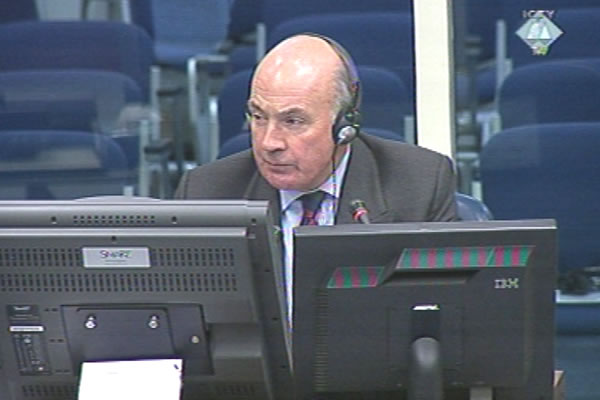Home
MLADIC RESPONSIBLE WHETHER ‘HE LIKES IT OR NOT’
Despite the efforts of the defense to describe the Republika Srpska Army as decentralized, British general Richard Dannatt ‘politely thanked’ them sharing with him the instructive materials in court. He nevertheless remained adamant that General Mladic was responsible for the events in the field, ’whether he likes it or not’
 Richard Dannatt, witness at the Ratko Mladic trial
Richard Dannatt, witness at the Ratko Mladic trial In the cross-examination of General Richard Dannatt, Mladic’s defense challenged the prosecution military expert’s conclusion that the Republika Srpska Army was based on the principle of centralized command and control. In his expert analysis of command and control in the VRS, Dannatt concluded that detailed orders came in from the top and that ‘nothing was done without Mladic’s authorization’.
According to Dannatt, the VRS’s structure was based on the corps and various units that were subordinate to them: the Territorial Defense, the paramilitary units including the Scorpions and all other formations in the field. The corps commanders had jurisdiction over everything in the field, and they in turn reported directly to the General Staff and General Mladic. Mladic was responsible ‘whether he likes it or not’. The defense counsel argued that the Scorpions were stationed in Djeletovci, Croatia, and that they were attached to the MUP of the Republic of Serbian Krajina. Dannatt remained adamant that the unit ‘operated in Republika Srpska, in the area of responsibility of the Krajina Corps’. The Scorpions were thus under Mladic’s command and control.
As the Srebrenica operation was in full swing, on 15 July 1995, Ratko Mladic met with the top officials of the international community in Belgrade, including General Rupert Smith. Dannatt claimed that at the meeting Smith ‘asked Mladic about the massacres, rapes and executions in Srebrenica’. According to the defense and Yasushi Akashi’s report of 17 July 1995, Mladic and Smith reached an informal agreement on a number of issues including the supply lines, rotation of UNPROFOR staff and freedom of movement. Dannatt replied that Mladic made a concession because he was afraid the events in and around Srebrenica would cause trouble for Republika Srpska. Asked if Mladic would have allowed Smith to come to Srebrenica if he had had anything to hide, Dannatt replied that at the time the men had already been executed and their bodies had been buried in places away from Srebrenica. Dannatt also said that when Mladic left for Serbia, the command was transferred to his chief of staff, Milovanovic, who always informed Mladic of his decisions before implementing them.
The defense counsel also presented an excerpt from Dannatt’s book in which he summarized his conclusions from the testimony at the trial of Drina Corps commander Radislav Krstic. Krstic’s ‘body language’ led him to conclude that Krstic considered that his blind acceptance of Mladic’s orders to kill the men in Srebrenica was a ‘mistake’, Dannatt wrote. Today Dannatt confirmed that he did not actually see Mladic’s ‘physical order’. But based on the chain of command, Dannatt concluded that Mladic was the only person who could issue such an order to Krstic.
In his book, Dannatt notes that during his stay in Banja Luka in 1995 he was ready to arrest Radovan Karadzic if he had half a chance, but that the situation with Mladic was ‘different’. Mladic’s arrest would have caused uproar, but ‘this monster cannot run forever – he will end up under arrest at one point’. When he was asked if he still considered Mladic to be a ‘monster he wanted to face justice’, Dannatt replied, ‘Yes’.
After General Dannatt, who is a former British chief of defense, completed his evidence, the prosecution called Ewa Tabeau. Tabeau is the prosecution’s demography expert.
Linked Reports
- Case : Mladic
- 2013-11-08 DEFENSE: INVESTIGATIONS OF ARTILLERY INCIDENT FULL OF FLAWS
- 2013-11-07 CONTESTING MARKALE 1
- 2013-11-05 MLADIC’S DEFENSE CONTESTS EXPERT FINDINGS ABOUT MARKALE 2
- 2013-11-13 PROSECUTOR: TOMASICA FINDINGS TO BE ADMITTED INTO MLADIC CASE
- 2013-11-14 HUMAN SHIELD ON MOUNT JAHORINA
- 2013-11-15 TRIAL CHAMBER ORDERS MEDICAL EXAMINATION FOR MLADIC
